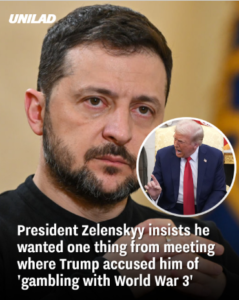In a recent and highly charged meeting at the White House, U.S. President Donald Trump accused Ukrainian President Volodymyr Zelenskyy of “gambling with World War III.” This confrontation has raised significant concerns about the future of U.S.-Ukraine relations and the ongoing conflict in Eastern Europe.
The Oval Office Confrontation
On February 28, 2025, President Zelenskyy visited Washington, D.C., aiming to secure a minerals deal with the United States and discuss security assurances amidst Ukraine’s ongoing conflict with Russia. The meeting, however, quickly escalated into a heated exchange. Vice President JD Vance criticized Zelenskyy’s approach, suggesting that diplomacy was the sole path to ending the war. Zelenskyy countered by highlighting Russia’s history of disregarding previous ceasefires between 2014 and 2022. President Trump intervened, accusing Zelenskyy of disrespecting the U.S. administration and recklessly risking global conflict. The situation deteriorated further, leading to the abrupt dismissal of the Ukrainian delegation from the White House without finalizing the anticipated minerals agreement.
Zelenskyy’s Position: Seeking Security Guarantees
President Zelenskyy’s primary objective during the meeting was to obtain concrete security guarantees from the United States to safeguard Ukraine against future Russian aggression. He emphasized that any ceasefire or peace agreement must be accompanied by robust assurances to prevent a recurrence of hostilities. Zelenskyy expressed concerns that without such guarantees, any pause in the conflict would merely serve as an opportunity for Russia to regroup and launch further attacks. He underscored the importance of a sustainable and just peace, cautioning against superficial agreements that could leave Ukraine vulnerable.
Trump’s Stance: Advocating Immediate Ceasefire
President Trump, on the other hand, advocated for an immediate ceasefire and direct negotiations with Russia. He expressed frustration over Zelenskyy’s insistence on security guarantees, perceiving it as a hindrance to swift peace efforts. Trump’s approach reflects a desire to reduce U.S. involvement in foreign conflicts and shift focus toward domestic priorities. He warned that prolonging the conflict without pursuing immediate peace could escalate tensions, potentially leading to a broader global confrontation.
International Reactions
The fallout from the contentious meeting elicited varied responses from the international community. European leaders, including French President Emmanuel Macron, expressed solidarity with Zelenskyy and emphasized the necessity of addressing Ukraine’s security concerns in any peace negotiations. Macron proposed a phased approach, starting with a truce followed by a comprehensive peace settlement that includes long-term security guarantees for Ukraine.
Conversely, the Kremlin interpreted the clash as evidence of Zelenskyy’s reluctance to pursue peace, suggesting that external pressure might be necessary to alter his stance. Russian officials accused the Ukrainian leadership of seeking to perpetuate the conflict rather than engaging in genuine peace efforts.
Implications for U.S.-Ukraine Relations
The abrupt and public nature of the disagreement has strained the traditionally strong ties between the United States and Ukraine. The failure to finalize the minerals deal not only represents a missed economic opportunity but also symbolizes a broader rift in diplomatic relations. Critics argue that the U.S. administration’s approach may embolden Russian aggression and undermine the morale of Ukrainian forces and civilians resisting invasion.
Conclusion
The recent confrontation between Presidents Trump and Zelenskyy highlights the complexities inherent in international diplomacy, especially when national interests and global security are at stake. While Zelenskyy seeks firm security guarantees to ensure Ukraine’s sovereignty and safety, Trump’s push for an immediate ceasefire without addressing underlying security concerns risks a fragile and potentially short-lived peace. The path forward requires careful negotiation, mutual respect, and a commitment to a just and lasting resolution that addresses the legitimate concerns of all parties involved.
